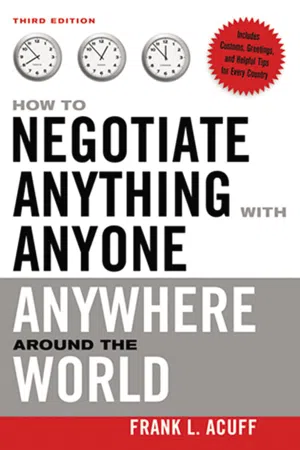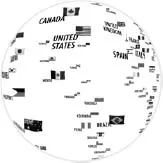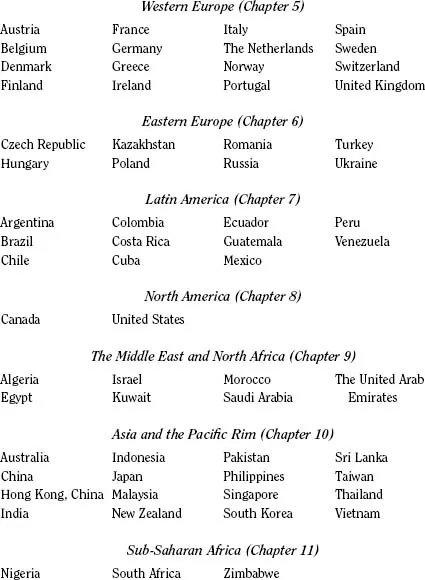![]()
PART THREE
Negotiating Around the World
In Part Three, we examine the specific skills required for effective business negotiations throughout the world. In Chapters 5 through 11, you will learn the how, what, when, and where of international negotiating on a regional and country-by-country basis. Seven regions of the world are profiled, with key information on the business environment, the specific cultural factors that affect negotiating, and practical dos and don'ts.
The discussion of each of the seven regions is divided into four sections:
- The business environment
- Cultural factors that affect negotiating
- How negotiations work
- Your negotiating primer
These sections consist of a great deal of practical, relevant information that will help you become a masterful negotiator. Keep in mind that the guidelines throughout these sections are primarily from a North American perspective and that such guidelines are relative. For example, when we say that the pace of negotiations in Western Europe is moderate; this is from a North American viewpoint. The Japanese might consider these negotiations to be quite fast-paced.
The “Cultural Factors” section in each chapter encompasses the four factors discussed in Chapter 3: (1) use of time; (2) individualism versus collectivism; (3) role orderliness and conformity; and (4) patterns of communication. The section “How Negotiations Work” is patterned after the six aspects of global negotiations also outlined in Chapter 3: (1) pace of negotiations; (2) negotiating strategies; (3) emphasis on personal relationships; (4) emotional aspects; (5) decision making; and (6) contractual and administrative factors.
A “negotiating primer” has been prepared for sixty-three countries, divided into regions:
The primers consist of practical dos and don'ts and other important day-to-day information. The focus for each country is on five areas:
- Fast facts: trading partners, key imports and exports, and other profile information on the country. This is based on 1990 data unless otherwise noted, and monetary figures are given in U.S. dollars.
- Reducing communication noise: techniques for getting your message through.
- Key negotiating pointers: country-specific negotiating guidelines.
- Day-to-day pointers: business entertainment and related matters.
- Gender issues: sensitivities and guidelines.
In addition, there is a section at the end of each primer called “Also Remember This…,” which provides further important background information to help you negotiate in that country.
The points that are emphasized within each of these categories differ from country to country. For example, a particular tactic is highlighted only if it seems of consequence in a particular country. Similarly, the ritual of toasts is mentioned under “Day-to-Day Pointers” only when this behavior is a key part of business entertainment. In some cases, a particular point is included because the information was available for that country and not for others.
Some issues are mentioned in almost all the primers. For example, the importance of being punctual is highlighted almost everywhere, even if TOS (The Other Side) keeps you waiting. This is because there is usually an expectation from TOS that you be on time, even if TOS is not. Popular sports are mentioned under “Conversation” in most primers because many individuals find it easy to discuss such matters. In all cases, use your own judgment on how to use this information. For example, many Canadians are rabid ice hockey fans, but if you sense that TOS has no interest in the subject, or if you clearly feel like a phony discussing it, then leave it alone. (“Conversation” also covers such topics as personal space and touching.) Some guidelines, such as the avoidance of political or religious discussions, can generally be followed anywhere, but are emphasized in those countries where these can be especially sensitive topics.
Let's continue our intercultural journey by stopping in Western Europe.
![]()
• CHAPTER 5 •
Negotiating in Western Europe
The Business Environment of Western Europe
Remember that negotiating in Western Europe can sometimes be quite challenging and that negotiating styles differ from country to country. If your experience in Western Europe is limited to vacations, you will probably find that behavior in business situations is quite different from what you have experienced.
The most important business development in Western Europe in the last few decades is the emergence of the European Union (EU). The European Union currently consists principally of Western European countries: Belgium, Denmark, France, Germany, Greece, Ireland, Italy, Luxembourg, the Netherlands, Portugal, Spain, and the United Kingdom. Eastern European countries are also members, such as the Czech Republic, Hungary, and Poland. It is likely that other countries will join the EU, mainly from Eastern Europe. The EU is a powerful economic and political force whose goals are to reregulate a Europe that is a single market—a Europe without frontiers, where there will be an unrestricted movement of money, products, services, and people.
Europeans see the EU as a critical step in regaining their competitive position with the United States, Japan, China, and other parts of the world. The biggest opportunities for member countries may lie in the ability to exploit economies that are available in the widely expanded “home” market.
The most likely impact of the EU on your business activities is in the area of common standards, deregulation, economic research and development, fiscal harmony, open government procurement, and taxation and tariff reforms.
What all this means in practical terms is that, among many other things, workers from member countries will be able to work anywhere in the EU, sales taxes and value-added taxes (VATs) will be made more uniform, foreign exchange controls will be discontinued, and property laws will be standardized. Products will be sold anywhere in the EU as long as they meet home-country standards. Flexible manufacturing will produce standard products (regarding packages and sizes) that will cater to local markets. But, again, realize that member countries will almost certainly retain key national differences when it comes to negotiations.
Cultural Factors That Affect Negotiating in Western Europe
Use of Time
The Western Europeans, more than any of the other cultures that we examine, share common views of time with North Americans. Business life is generally quite fast-paced, and meetings almost always start and end on time. Expect negotiations to move crisply in most of Western Europe.
Individualism vs. Collectivism
Western Europeans are generally quite individualistic. There is generally a distinction between one's core of intimate associates and those outside that core. Status and class consciousness are prevalent. One joins groups that are within one's class status. Friendships usually take a long time to develop. As with other high-individualism parts of the world, the individual is emotionally independent from the work organization. The emphasis is on individual initiative and achievement.
Role Orderliness and Conformity
Order, discipline, and responsibility are highly valued in the family and at work. The path to the corporate world is a mixture of education and connections. Leisure time with the family is extremely important, and month-long summer holidays (vacations) are typical.
Power in organizations flows from the top down, and the hierarchy is important. Top managers usually have a great deal of technical expertise and tend to dislike power sharing and delegation of responsibility. In addition, top managers do not communicate regularly with lower management. Conseque...



